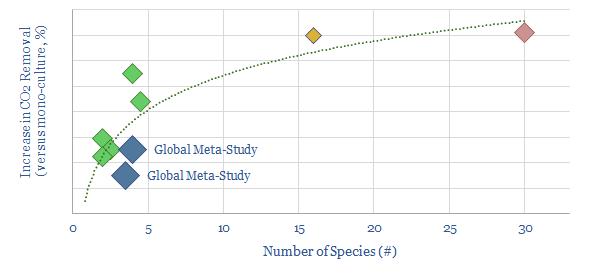The purpose of this data-file is to estimate how biodiversity impacts forest CO2 carbon content and absorption. We have done this by reviewing ten technical papers.
The average result in global meta-studies is that biodiverse forests take up 15-25% more CO2 than mono-culture counterparts.
The best studies found that highly biodiverse restoration projects can take up 50-70% more CO2, which was also correlated with the total number of species in a classic ‘log’ relationship.
Full details of individual studies, and our notes, follow in the data-file.
Our route to net zero carbon emissions includes 17GTpa of nature based CO2 abatement. A part of this is ameliorating natural eco-systems, but most of it is from reforesting 3bn of the 5bn acres that has been deforested by mankind, thus releasing 25% of all anthropogenic CO2. The above studies claim that biodiversity impacts forest CO2 absorption in a positive way, suggesting that biodiversity should be a major target in reforestation projects to maximize their effects.
Historically, carbon offset projects have not had sufficiently high quality, in our opinion. If buyers of carbon credits cannot trust a project, then its future carbon credits will end up heavily discounted. We expect this will improve in the future.
